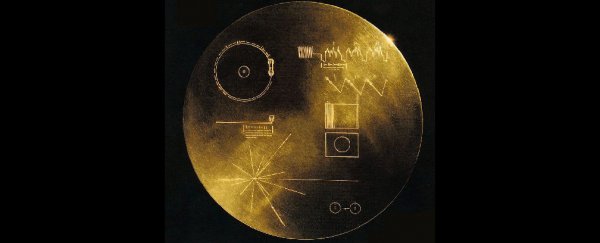What do extraterrestrials listen to? Well, we don't know for sure, but when NASA launched Voyager 1 and 2 into the Solar System in 1977, the space agency equipped the probes with the 'Golden Record', intended for any aliens (or future humans) who might one day discover the recordings. The record is a phonograph compilation of greetings from Earth in several languages and other accompanying audio designed to introduce the listener to the sounds of 20th century humankind.
Those recordings have now been uploaded to Soundcloud so anybody with an Internet connection can experience this unique time capsule for themselves (no alien-ness required), knowing that the distant originals meanwhile are drifting through space somewhere.
Specifically, Voyager 1 is thought to have passed through the heliosphere at the boundary of our Solar System, and is on its way to a star called AC +79 3888 – although the journey will take it some 40,000 years. Voyager 2 is still in the heliosphere. You can check their real-time locations here.
So what does the Golden Record sound like? Well, once you get past the greetings recorded in more than 50 languages, both ancient and modern (the English version is read by an American child, who says, "Hello from the children of Planet Earth") you encounter an unusual assortment of sounds that are evocative of life on Earth, which have an eerie, almost David Lynchian quality to them when played back now.
There's a crying baby being comforted by a mother, automobile sounds, Morse code (with a ship's foghorn blaring in the background), animal noises, wind and rain, and an electronic 'Music of the Spheres' recording, which emulates planetary motion via playback of different audio frequencies.
In addition to these recordings, the Golden Record also contains about 90 minutes of musical recordings, but these haven't been uploaded to Soundcloud (presumably for copyright reasons). Picks include Chuck Berry's 'Johnny B. Goode', Beethoven's Symphony No. 5, First Movement, and numerous examples of traditional music from cultures around the world. Interestingly, the Beatles' 'Here Comes The Sun' was supposed to be included – the band were said to be in favour of taking part, but their record label EMI vetoed it.
The Golden Record also contains an introductory statement from then US president Jimmy Carter, who summarises some of the aspirations of the scientists who assembled the first galactic mix tape:
We cast this message into the cosmos. It is likely to survive a billion years into our future, when our civilisation is profoundly altered and the surface of the Earth may be vastly changed. Of the 200 billion stars in the Milky Way galaxy, some – perhaps many – may have inhabited planets and spacefaring civilisations. If one such civilisation intercepts Voyager and can understand these recorded contents, here is our message:
This is a present from a small distant world, a token of our sounds, our science, our images, our music, our thoughts, and our feelings. We are attempting to survive our time so we may live into yours. We hope someday, having solved the problems we face, to join a community of galactic civilisations. This record represents our hope and our determination, and our good will in a vast and awesome universe.
